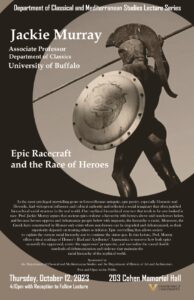2023/2024 Lecture Series Event: Epic Racecraft and the Race of Heroes
The Department of Classical and Mediterranean Studies welcomes Professor Jackie Murray to present the lecture, Epic Racecraft and the Race of Heroes, as part of the Classical and Mediterrranean Studies 2023/2024 Lecture Series. Jackie Murray is an Associate Professor in the Department of Classics at University of Buffalo. This lecture will be presented on Thursday, October 12, 2023 at 4:10pm in 203 Cohen Memorial Hall. A reception will follow this presentation in the Cohen Memorial Hall Atrium.
As the most privileged storytelling genre in Greco-Roman antiquity, epic, especially Homeric and Hesiodic epic, had widespread influence and cultural authority and reflected a social imaginary that could be and often were appealed to justify hierarchical social structure in the real world. One particular mythical hierarchical structure that tends to be overlooked is race. In this presentation, Professor Murray argues that the ancient epics implicitly endorse a hierarchy with heroes at the top and non-heroes below them, and because the people at the bottom are those they oppress and dehumanize with impunity, the hierarchy is racial. Moreover, the Greek hero, especially as constructed by Homer, can only exist where non-heroes can be degraded and dehumanized, so their superiority depends on them treating others as inferior. In other words, epic storytelling has the capacity to be one way a society explains to itself why the current racial hierarchy is the way it is––and more importantly, why it should stay that way. In this talk, Professor Murray offers close critical readings of Homer’s Iliad and Apollonius’ Argonautica to uncover the racial dynamic operating among the heroes and the oppressed peoples of the mythical world, whom they enslaved, brutalized, and exterminated. Both epics monstrify the oppressed, center the oppressors’ perspective, and normalize the moral double standards of the dehumanization and violence that maintains the racial hierarchy of the mythical world.
This event is sponsored by the Department of Classical and Mediterranean Studies and the Department of History of Art and Architecture. It is free and open to the public.
